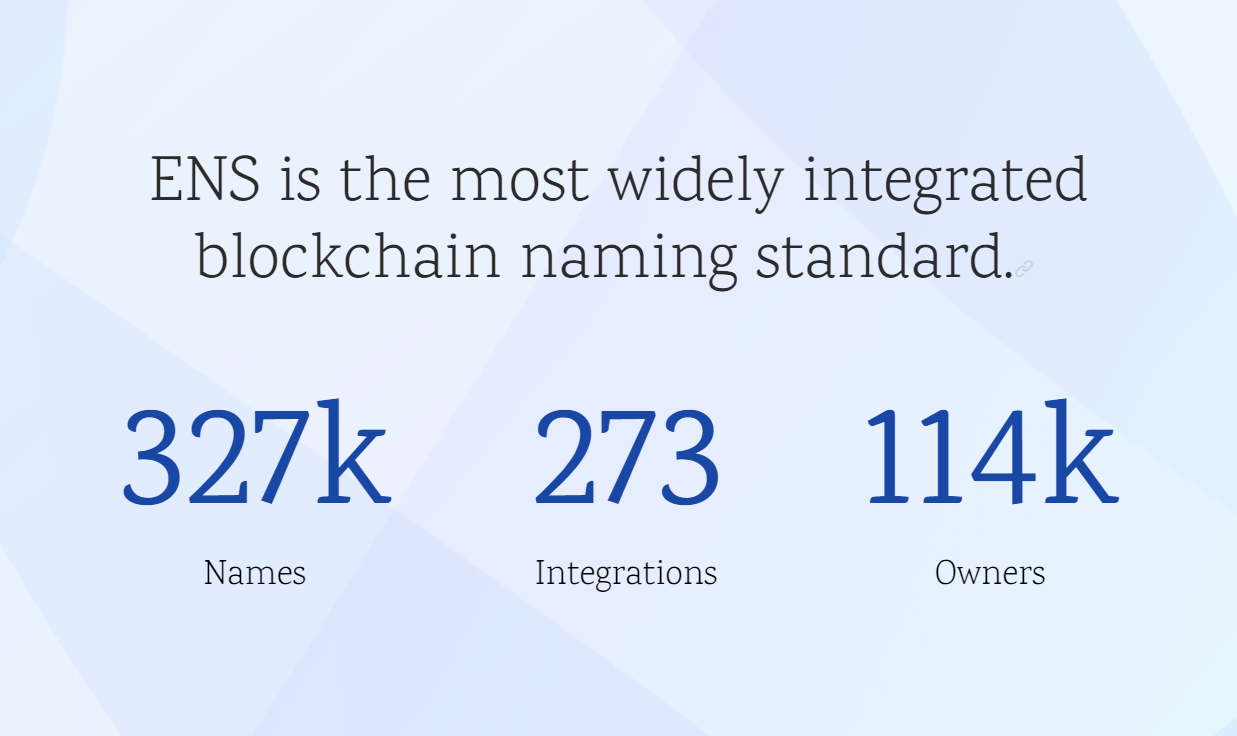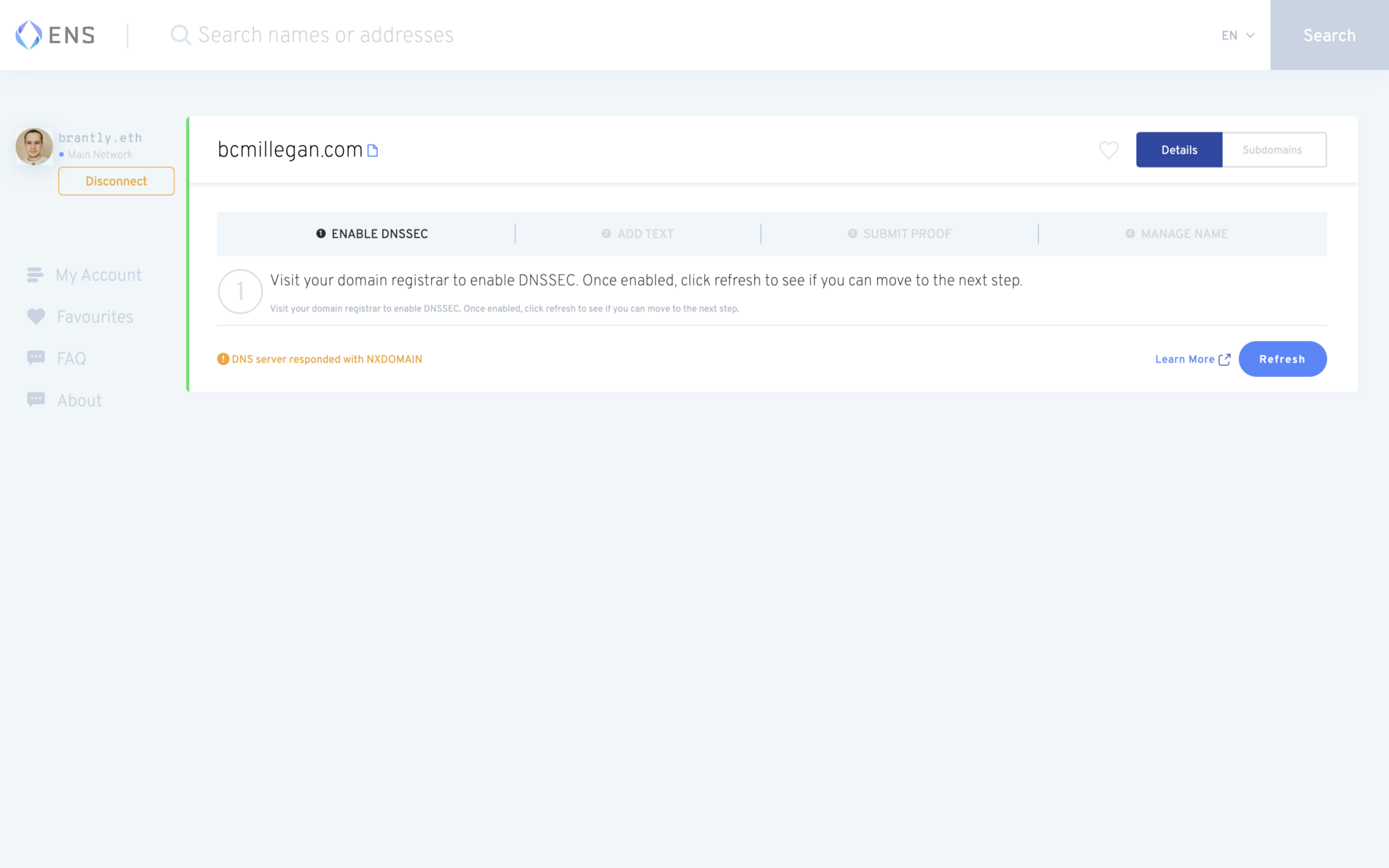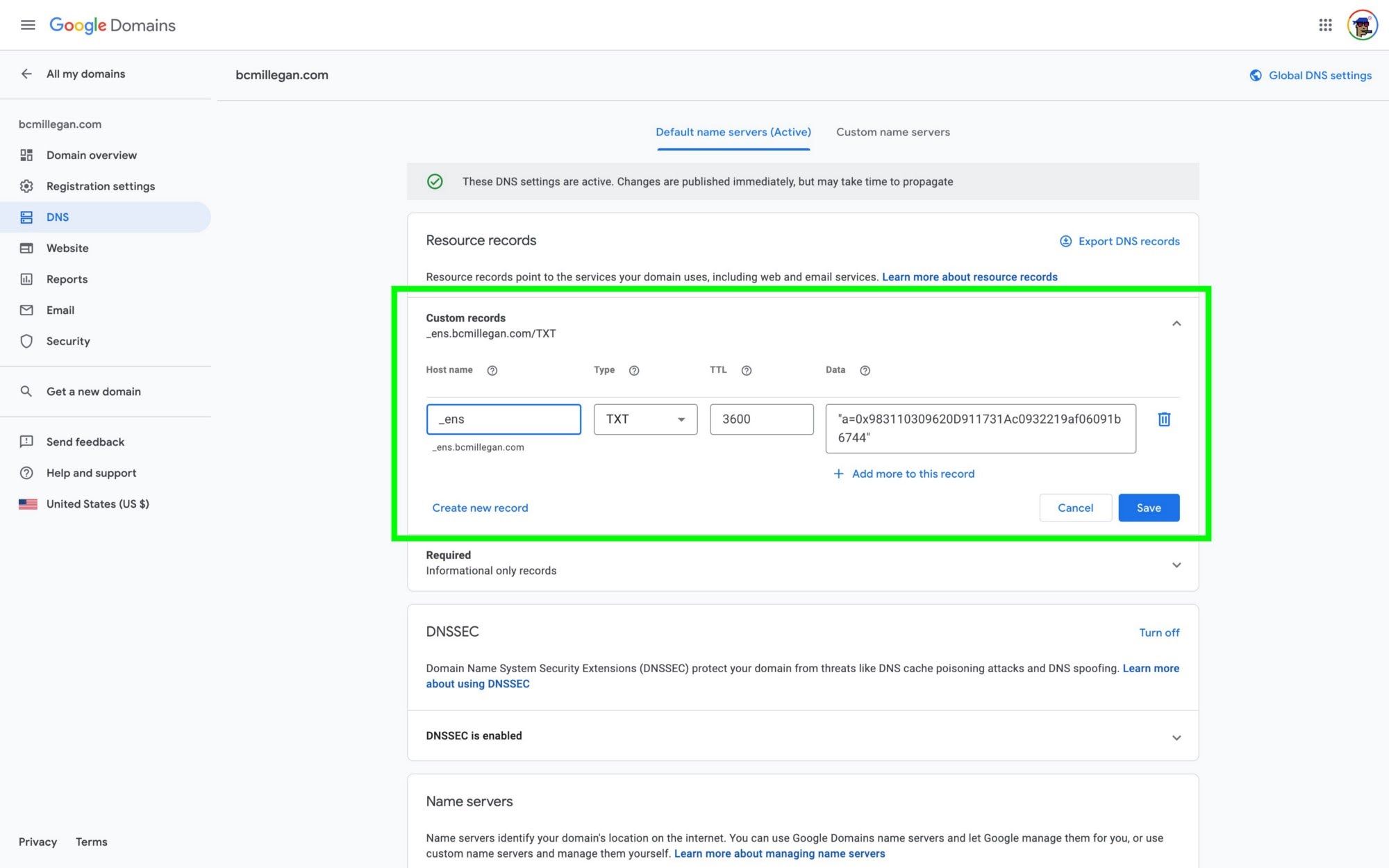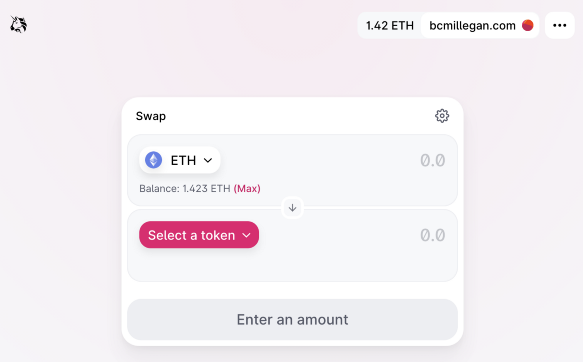How to use your .com as an ETH address

Dear Bankless Nation,
Cryptographic addresses aren’t made for humans.
Yeah, just send the money to my ETH address, it’s 0x123asd1231…
Imagine having to say that out loud? Doesn’t work.
Websites used to have the same problem before they solved it with human-readable DNS domain names followed by .com, .org, and .io.
Google’s IP address 142.250.217.68 is hard to remember. But Google.com is easy.
Crypto is solving it too. ENS is a universal standard for human-readable crypto addresses. I can use rsa.eth instead of 0xe9d18dbfd10…in the future, I expect ETH addresses to provide us a self-sovereign single sign-on for the entire internet!
Now ENS is taking it another step further.
As of last week, ENS now supports DNS (the phonebook for the internet!), meaning you can now use your old school website domain as an ETH address too. 👀
Send and receive payments using any old website domain (like .com, .org, .net)?
Yes.
This is a major unlock for the crypto ecosystem.
Here’s how to set it up.
- RSA
How to use your website as an ENS

The Ethereum Name Service (ENS) just integrated full support for Domain Name System (DNS) namespace, the “phonebook of the internet.”
The new functionality means DNS domain owners can now import their traditional domains to use as an ENS, crypto’s most widely used blockchain naming standard.
Accordingly, this Bankless tactic will walk you through this domain importing process to show you how to give your dot-com website its next level-up, an ETH address!
- Goal: Learn how to import a DNS domain to ENS
- Skill: Intermediate
- Effort: 1 hour to learn the basics of importing
- ROI: Linking your website to Web3!
First, what is ENS?
ENS is a decentralized naming standard for wallets, websites, and more.
Launched on Ethereum in 2017, ENS offers a human-readable, easy-to-use naming system for the whole crypto economy. This is because while “.eth” is the native top-level domain of ENS, the naming standard also supports configuring addresses and receiving payments from +100 different blockchains, like Bitcoin, Dogecoin, and Zcash.
Moreover, people can use their ENS names (which are maintained as NFTs) to readily store their avatar and profile data in a singular, decentralized manner. These dynamics have led to these names increasingly being embraced as ownable Web3 usernames that double as a “Single Sign-On” solution for dapps.

The ENS team is currently working on making this Ethereum-based “Single Sign-On” solution easily usable across traditional Web2 services too.
However, ENS isn’t interesting just because of this functionality alone. Indeed, last week the project’s builders unveiled full DNS namespace integration for ENS, an advancement that opens the way for any conventional web address to become an ETH address and more!
Bankless Resources on ENS:
Understanding the DNS integration
Years ago, the ENS team made the decision to avoid releasing new ENS-native TLDs beyond .eth “in favor of integrating the existing DNS namespace,” ENS Director of Operations Brantly Millegan recently explained.
The idea? To put ENS in the best position for mainstream success in the long run.
That said, ENS deeply embracing DNS domains has been a long time coming. The project made its first foray into DNS support back in Sept. 2018 when it launched support for .xyz domains.
Last week’s announcement of full DNS namespace integration marks the completion of an important milestone for ENS and the wider Web3 movement; now people can use any DNS suffix (e.g. .com, .org, .edu, .cash) to receive crypto payments and more.
💡 Is this bearish for .eth names?
People asked me if support for .coms is bearish for .eth names. After all, if you can use a .com for your Ethereum address why would you need a .eth?
I don’t think this is bearish for .eth at all for three reasons: 1) support for DNS names further legitimizes Ethereum and .eth along with it 2) .eth names are NFTs and will remain the most crypto native domain collectible 3) .eth names are native to Ethereum and remain much more trustless than DNS names - RSA
How to import your DNS to ENS
ENS recently published a comprehensive guide on how to import your DNS to ENS, which I highly recommend checking out if you want to review an in-depth walkthrough.
For now, if you’re just interested in quickly getting up to speed, I’ll outline the key steps below.
👉 Note: As mentioned in the ENS guide above, this outline will assume you already 1) own a DNS domain, 2) an Ethereum account, and 3) some ETH to cover gas.
- Head to the ENS Manager App and connect your wallet.
- Using the ENS search bar, search for and select the DNS domain you want to import.

- Next, navigate to your DNS Registrar, and under your domain’s settings opt to enable the DNSSEC standard if it’s not already enabled.
- In the “records” area of your DNS settings, create a new record using _ens for the host, TXT for the type, and a=[your Ethereum address] for the data.

- At this point, return to your domain’s page in the ENS Manager App to check and see if your new TXT record and DNSSEC settings have come through. This process could take hours, so don’t worry if you don’t see results immediately.
- Once your records are updated, click on the “Register” button provided by ENS. Now your wallet will prompt you with a transaction to import your DNS into the ENS system — press “Confirm” and wait for the transaction to finalize.
- That’s all it takes to import a DNS to ENS! Next, you can head into the “Details” dashboard of your domain to manage its records, e.g. to add an avatar or crypto address beyond your chosen ETH account.
- One final thing you can do is go into ENS’s “My Account” interface and set your domain’s reverse record, which means choosing which one of your ENS names you want to appear when you connect to dapps.

Comparing ENS vs. DNS
So why ENS + DNS, why not one or the other?
With this new integration, ENS and DNS names can now function as your Web3 username. As such, this advancement essentially extends the utility of DNS domains into the Web3 realm more than anything.
It’s worth pointing out that ENS names are permissionless whereas DNS names are ultimately permissioned, as ENS’s Brantly Millegan has noted:
“Because .ETH names are native to ENS, ENS is the only source of truth for who owns a particular one, and no admin powers exist in ENS to take away a user’s .ETH name.
Such admin powers do ultimately exist, however, for DNS names on ENS. Because whoever owns the name on DNS can always claim the corresponding name on ENS, the ultimate security of a DNS name on ENS depends on the security of the name on DNS.”
The big picture
ENS embracing DNS gives all regular websites the option of unleashing Ethereum-based Web3 account powers. That’s a huge deal in the crypto ecosystem’s journey toward mainstream adoption!
This intersection will also surely serve as a catalyst for many innovations to come as more people start exploring the possibilities at the new crossroads of ENS and DNS.
Watch this space—you never know what could happen.
Action steps
- 🖱️ If you haven’t already, register an ENS name. You can do so any time via app.ens.domains!